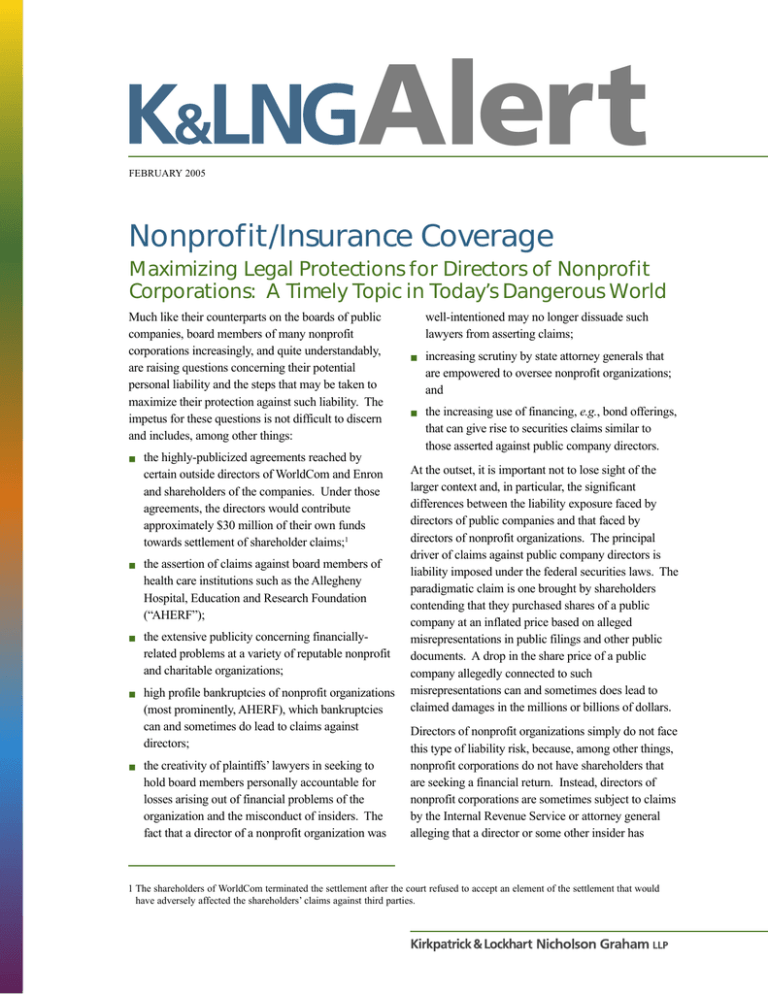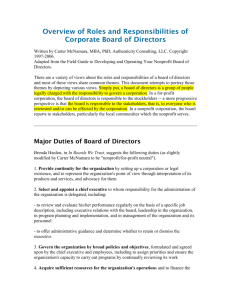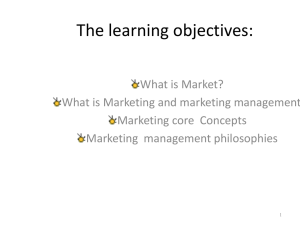
FEBRUARY 2005
Nonprofit / Insurance Coverage
Maximizing Legal Protections for Directors of Nonprofit
Corporations: A Timely Topic in Today’s Dangerous World
Much like their counterparts on the boards of public
companies, board members of many nonprofit
corporations increasingly, and quite understandably,
are raising questions concerning their potential
personal liability and the steps that may be taken to
maximize their protection against such liability. The
impetus for these questions is not difficult to discern
and includes, among other things:
■
the highly-publicized agreements reached by
certain outside directors of WorldCom and Enron
and shareholders of the companies. Under those
agreements, the directors would contribute
approximately $30 million of their own funds
towards settlement of shareholder claims;1
■
the assertion of claims against board members of
health care institutions such as the Allegheny
Hospital, Education and Research Foundation
(“AHERF”);
■
the extensive publicity concerning financiallyrelated problems at a variety of reputable nonprofit
and charitable organizations;
■
high profile bankruptcies of nonprofit organizations
(most prominently, AHERF), which bankruptcies
can and sometimes do lead to claims against
directors;
■
the creativity of plaintiffs’ lawyers in seeking to
hold board members personally accountable for
losses arising out of financial problems of the
organization and the misconduct of insiders. The
fact that a director of a nonprofit organization was
well-intentioned may no longer dissuade such
lawyers from asserting claims;
■
increasing scrutiny by state attorney generals that
are empowered to oversee nonprofit organizations;
and
■
the increasing use of financing, e.g., bond offerings,
that can give rise to securities claims similar to
those asserted against public company directors.
At the outset, it is important not to lose sight of the
larger context and, in particular, the significant
differences between the liability exposure faced by
directors of public companies and that faced by
directors of nonprofit organizations. The principal
driver of claims against public company directors is
liability imposed under the federal securities laws. The
paradigmatic claim is one brought by shareholders
contending that they purchased shares of a public
company at an inflated price based on alleged
misrepresentations in public filings and other public
documents. A drop in the share price of a public
company allegedly connected to such
misrepresentations can and sometimes does lead to
claimed damages in the millions or billions of dollars.
Directors of nonprofit organizations simply do not face
this type of liability risk, because, among other things,
nonprofit corporations do not have shareholders that
are seeking a financial return. Instead, directors of
nonprofit corporations are sometimes subject to claims
by the Internal Revenue Service or attorney general
alleging that a director or some other insider has
1 The shareholders of WorldCom terminated the settlement after the court refused to accept an element of the settlement that would
have adversely affected the shareholders’ claims against third parties.
inappropriately benefited from his, her or its
relationship with the nonprofit corporation. In
addition, they are also subject to occasional
employment practices claims.
insurance protection. In many instances, the terms of
coverage can be enhanced, if, but only if, the nonprofit
corporation knows what to ask for – before the
coverage is placed.
In response to the developments noted above and in
an effort to ensure that they retain qualified board
members, a growing number of nonprofit corporations
– particularly those with substantial assets or “high net
worth” board members or engaged in high-risk
activities – are undertaking a legal review to ensure
that appropriate legal protections are available to their
board members. In this regard, some nonprofit
corporations, such as major universities, health care
institutions, and other charitable organizations, have
sought the assistance of law firms with specialists who
concentrate their practice in the areas of insurance
coverage and nonprofit law.
Among the D&O insurance questions of greatest
interest to nonprofit corporations and their directors
are the following:
■
Adequacy of Limits. Are the policy limits adequate,
taking into account, among other things, the fact
that defense costs typically count towards
exhaustion of the policy limits?
■
Priority of Payments. If it turns out that the policy
limits are insufficient to satisfy all of the claims for
coverage, do the directors’ rights to be paid under
the policy take priority over those of other insureds,
especially those of the nonprofit itself? This is
particularly important given that the typical
nonprofit D&O policy covers many insureds
besides the directors and covers risks besides D&O
liability (e.g., the nonprofit’s employment practices
liability).
■
Voiding the Policy. Is the director protected against
the risk that the policy will be rescinded as to him
or her simply because, unbeknownst to the director,
there are misstatements in the insurance
application?
■
Choice of Counsel. Will the director be entitled to
choose appropriate counsel to defend against a
claim, or will the director be required to use
potentially less effective counsel chosen by the
insurer (often to reduce the cost of defense)?
■
Bankruptcy Claims. If the nonprofit corporation
becomes insolvent and a derivative claim is asserted
on behalf of the debtor entity alleging that the
director breached various duties to the nonprofit
corporation, does the “insured versus insured”
exclusion preclude coverage for the director?
■
ODL Coverage. If the director is employed by
another organization, does the director have outside
director liability (“ODL”) coverage under his or her
employer’s D&O policy?
D&O INSURANCE
One of the most basic, but least appreciated, facts of
relevance to nonprofit board members is this: the
terms of coverage provided by D&O insurance
contracts are not the same. Rather, they differ in
numerous respects, and those differences matter.
They can determine whether the director is covered
for a claim asserted against him or her or whether
the director is not covered and therefore potentially
personally responsible for paying attorneys’ fees
and the cost of any settlements and judgments in
connection with a third-party claim against the
director.
For years, insurance brokers have played a nearly
exclusive role in advising nonprofit corporations on
D&O insurance matters, including reviewing and
negotiating the terms of coverage. For a growing
number of nonprofit corporations, this practice is
changing. D&O insurance contracts, after all, are
fundamentally legal documents. The meaning, and the
value, of a D&O insurance policy is ultimately
determined by rulings of a court/arbitrator, by a verdict
of a jury, or more commonly by what the parties
expect such rulings or verdicts will be. Accordingly,
nonprofit organizations increasingly are seeking the
assistance of legal counsel, experienced in such
insurance coverage matters, to review the proposed
policy wording, to recommend wording
improvements, and to collaborate with the broker and
the nonprofit corporation in securing appropriate D&O
2 FEBRUARY 2005
For some directors, the answers to these potentially
important questions are favorable; for many others, the
answers unfortunately are not.
KIRKPATRICK & LOCKHART NICHOLSON GRAHAM LLP
LIMITATION OF LIABILITY
To reduce the risk of liability to its directors, a
nonprofit corporation should include in its governing
documents language providing that a director will not
be liable to the extent liability may be limited by law.
Often this will mean that a director will not be liable
for actions or omissions that are merely negligent and
that, to prevail, a plaintiff must be able to demonstrate
that, at a minimum, the director’s action or omission
was reckless, willful or criminal. While such a
provision will not dissuade every plaintiff from
bringing an action against the director, it does raise
substantially the burden that the plaintiff must satisfy to
obtain relief, thereby perhaps allowing the director to
defend himself or herself successfully.
■
BEST PRACTICES
The boards of many nonprofit corporations are
pursuing what many informed observers believe to be
the best first line of defense: they are assessing the
policies and practices of the nonprofit organization
with an eye toward identifying and implementing
policies and practices designed to demonstrate that the
directors are fulfilling their duties of care and loyalty.
Items that might be addressed include:
■
Conflict of Interest Policy. Does the corporation
have an adequate conflict of interest policy? Does
it comply with it? Who monitors compliance?
■
Restricted Funds. How does the corporation
handle its restricted funds? Do policies and
practices assure that restricted funds are always
used and invested as required by law?
■
Gift Acceptance, Spending and Investment Policies.
Does the corporation have and follow policies and
practices that assure it accepts only gifts that do not
pose undue risks? Does the corporation have a
spending policy assuring that endowment and trust
funds are spent only as permitted by law? Does the
corporation have an investment policy regarding
how and by whom its funds are invested? Is the
policy adequate to demonstrate that the directors
are exercising their fiduciary duty regarding
invested assets?
■
CEO Compensation. Who determines CEO
compensation? Is the compensation reasonable?
How does the board know that?
■
Employment Policies and Practices. Does the
corporation have and follow practices and policies
intended to assure that its employment practices
comply with law?
■
Board Information. Do directors receive financial
and other information sufficient to enable them to
understand the corporation’s finances and
operations and make prudent decisions? Are
directors readily able to secure any additional
information that they require? Do directors
actually review and understand the information?
Do directors reach an independent conclusion
INDEMNIFICATION
In the event of a claim, the first level of protection for
the director of a nonprofit corporation is, of course, not
the D&O insurance contract, but rather the nonprofit
corporation itself and its indemnity obligation to the
director. Yet, as is the case with D&O insurance
policies, the extent and nature of the indemnity rights
available to directors varies, depending on both the
precise wording of the relevant documents providing
indemnification and the applicable law. Many
nonprofit corporations and their directors not
surprisingly are re-examining the indemnity
protections available to the directors in these more
perilous times.
The issues of interest include the following:
■
■
■
Mandatory or Permissive. Does the indemnification
language require that the corporation indemnify the
director or merely permit it? What are the standards
that must be satisfied? How does the director seek
indemnification? Does the language provide for
indemnification in connection with actions brought
against the director on behalf of the corporation?
Advancement. Does the indemnification language
require the corporation to advance funds to the
director prior to a final resolution of the matter? Or,
must the director bear defense costs until the matter
is settled or adjudicated?
Available Assets. Does the corporation have
sufficient unrestricted assets to satisfy its
indemnification obligations to all parties entitled to
be indemnified? If not, how are available assets
allocated among those entitled to indemnification?
3 FEBRUARY 2005
Separate Contract. When and how can the
provisions in the governing document be changed?
Should the director seek a separate indemnification
agreement with the corporation?
KIRKPATRICK & LOCKHART NICHOLSON GRAHAM LLP
based upon the information provided to them
rather than “rubber-stamping” management
recommendations?
■
Board Composition and Participation. Does the
board include persons with the necessary
expertise? Do all directors actively participate in
the work of the board? Is the board so large that
some directors feel disenfranchised?
■
Governance Structure of the Board. Does the board
have an appropriate committee structure? What is
the nominating process? Are appropriate meeting
practices in place?
■
Audit Practices. Does the board obtain an annual
audit from an independent auditor? Does the
auditor report to the board or the staff? Are
adequate internal controls in place?
■
Licenses and Filing. Does the corporation timely
file its Form 990 and all required employment
forms and timely remit all employment taxes? Is
the corporation appropriately registered to solicit
charitable contributions?
4 FEBRUARY 2005
■
Whistleblower and Document Destruction Policies.
Does the corporation have and follow satisfactory
policies regarding whistleblowers and destruction
of documents?
The preceding list is not, and is not intended to be, an
exhaustive description of all matters that a nonprofit
corporation and its prudent and diligent board might
wish to consider. However, it is hoped that the list will
assist nonprofit corporations and their boards in
addressing this timely subject. To summarize: first,
sound and well-considered practices and policies will
reduce the risk that claims against directors will be
asserted and, if asserted, will be successful; and
second, suitable and carefully-reviewed
indemnification and limitation of liability provisions
and D&O insurance terms will enhance the protections
afforded to any director that becomes subject to a
claim.
Susan M. Mussman
Thomas M. Reiter
smussman@klng.com
treiter@klng.com
412.355.8658
412.355.8274
KIRKPATRICK & LOCKHART NICHOLSON GRAHAM LLP
Susan M. Mussman is a partner in Kirkpatrick & Lockhart Nicholson Graham’s Nonprofit Institutions/Organization Group.
Lawyers in the Nonprofit Institutions/Organizations Group address the special needs and individual problems of their
nonprofit and charitable clients in both the United States of America and the United Kingdom. For further information,
please consult our website at www.klng.com.
Boston
Dallas
Harrisburg
London
Los Angeles
Miami
Newark
New York
Pittsburgh
San Francisco
Washington, D.C.
Stephen E. Moore
Robert Everett Wolin
Ruth E. Granfors
Carole Cook
Thomas J. Poletti
Daniel A. Casey
Stephen A. Timoni
Martin F. Richman
Susan M. Mussman
Peter W. Sheats
George W. Koch
smoore@klng.com
rwolin@klng.com
rgranfors@klng.com
ccook@klng.com
tpoletti@klng.com
dcasey@klng.com
stimoni@klng.com
mrichman@klng.com
smussman@klng.com
psheats@klng.com
gkoch@klng.com
+1.617.951.9191
+1.214.939.4909
+1.717.231.5835
+44 (0) 207.360.8272
+1.310.552.5045
+1.305.539.3324
+1.973.848.4020
+1.212.536.3945
+1.412.355.8658
+1.415.249.1030
+1.202.778.9110
Fax +1.617.261.3175
Fax +1.214.939.4949
Fax +1.717.231.4501
Fax +44 (0) 20 7648 9001
Fax +1.310.552.5001
Fax +1.305.358.7095
Fax +1.973.848.4001
Fax +1.212.536.3901
Fax +1.412.355.6501
Fax +1.415.249.1001
Fax +1.202.778.9100
Thomas M. Reiter is a partner in K&LNG’s Insurance Coverage group. For nearly 25 years, our Insurance Coverage
practice has been developing and implementing innovative legal strategies to assist businesses and individuals in
obtaining insurance coverage for an ever-increasing range of liabilities and losses. For further information, please
consult our website at www.klng.com.
International Contact
Boston
Dallas
Harrisburg
London
Los Angeles
Miami
Newark
New York
Pittsburgh
San Francisco
Washington
Peter J. Kalis
John M. Edwards
Robert Everett Wolin
Carleton O. Strouss
John Magnin
David P. Schack
Daniel A. Casey
Anthony P. La Rocco
Eugene R. Licker
James R. Segerdahl
Thomas M. Reiter
Edward P. Sangster
Matthew L. Jacobs
pkalis@klng.com
jedwards@klng.com
rwolin@klng.com
cstrouss@klng.com
jmagnin@klng.com
dschack@klng.com
dcasey@klng.com
alarocco@klng.com
elicker@klng.com
jsegerdahl@klng.com
treiter@klng.com
esangster@klng.com
mjacobs@klng.com
+1.412.355.6562
+1.617.261.3123
+1.214.939.4909
+1.717.231.4503
+44 (0) 20 7648 8168
+1.310.552.5061
+1.305.539.3324
+1.973.848.4014
+1.212.536.3916
+1.412.355.6784
+1.412.355.8274
+1.415.249.1028
+1.202.778.9393
Fax +1.412.355.6501
Fax +1.617.261.3175
Fax +1.214.939.4949
Fax +1.717.231.4501
Fax +44 (0) 20 7648 9001
Fax +1.310.552.5001
Fax +1.305.358.7095
Fax +1.973.848.4001
Fax +1.212.536.3901
Fax +1.412.355.6501
Fax +1.412.355.6501
Fax +1.415.249.1001
Fax +1.202.778.9100
www
w.. k l n g . c o m
BOSTON
■
DALLAS
■
HARRISBURG
■
LONDON
■
LOS ANGELES
■
MIAMI
■
NEWARK
■
NEW YORK
■
PITTSBURGH
■
SAN FRANCISCO
■
WASHINGTON
Kirkpatrick & Lockhart Nicholson Graham is a combination of two limited liability partnerships, each named Kirkpatrick & Lockhart Nicholson Graham LLP, one established in Delaware,
USA, and one incorporated in England.
This publication/newsletter is for informational purposes and does not contain or convey legal advice. The information herein should not be used or relied upon in regard to any particular
facts or circumstances without first consulting a lawyer.
Unless otherwise indicated, the lawyers are not certified by the Texas Board of Legal Specialization.
Data Protection Act 1998 - We may contact you from time to time with information on Kirkpatrick & Lockhart Nicholson Graham LLP seminars and with our regular newsletters, which
may be of interest to you. We will not provide your details to any third parties. Please e-mail cgregory@klng.com if you would prefer not to receive this information.
© 2005 KIRKPATRICK & LOCKHART NICHOLSON GRAHAM LLP. ALL RIGHTS RESERVED.






